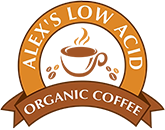What’s in your coffee? Hopefully there are high-quality, great-tasting coffee beans. But what else is in there? Is there a long list of unpronounceable, synthetic herbicides, pesticides, and other chemicals? If your coffee comes from beans that were grown using conventional methods, there’s no way for you to actually know.
If you’re not already drinking organic coffee, should you make the switch to a trusted brand such as Alex’s Low-Acid Organic Coffee? What might the millions of Americans who already choose organic coffee know that you may not know? Here are some reasons to drink organic coffee.
Avoiding Unhealthy Herbicides and Pesticides
First up, there’s your health. Conventional methods used for growing coffee beans may include using synthetic herbicides, fungicides, and pesticides. As with other crops, coffee beans are at risk for being overrun or damaged by weeds, fungi, and pests.
Synthetic herbicides, fungicides, and pesticides can be effective at fighting these threats to the coffee bean crop, but at what cost? These products may have chemicals with health risks. Headaches, nausea and vomiting, and allergic reactions are short-term risks, but there are long-term risks that may not be seen for years. Depression, certain types of cancer, weight gain, and diabetes may result from high-consumption of certain synthetic products used on crops over time.
Environmental and Sustainability Reasons
This probably isn’t a surprise, but we’ll say it anyway: if it’s not good for you, it’s probably not good for the environment. Putting synthetic chemicals onto plants and into soil isn’t the best for the ecosystem or sustainability. These compounds may harm animals and other plants, and they can shorten the lifespan of the soil.
Nutritional Benefits of Organic Coffee
Coffee is linked to a variety of health benefits, including weight control, improved heart health, better mood, and lower blood sugar. Organic coffee can also be high in nutrients, such as antioxidants and anti-inflammatory compounds. The content of these compounds is supported by eco-friendly practices that may be used to maintain healthy crops using organic farming.
Humanitarian Reasons
Even if your health and the health of the environment and ecosystem weren’t at risk with conventional farming practices, the health of the people who grow and process the beans may be. What happens when they come into contact with herbicides and fungicides? What about the people who may live downwind of them and are forced to breathe such chemicals every time they are sprayed onto a field? It may be more ethical just to choose organic coffees that don’t use such processes.
Decaffeinated Coffee and Benefits of an Organic Process
Decaffeinated coffee is conventionally produced using chemical solvents to help eliminate the caffeine. Methylene chloride is a common one. Organic decaffeinated coffee, in contrast, uses a process called the Swiss Water Process. It is basically a filtration process through a charcoal filter.
Strict Standards for Organic Coffee
“Organic” isn’t just a buzzword. It’s a real term with a specific definition and strong regulation. The Department of Agriculture, or USDA, oversees the National Organic Program, or NOP. Coffee beans are regulated from growth to packaging and sale. They must be grown on land that has been without banned substances for at least three years, and the entire processing procedure must also take place without any banned substances, including many synthetic chemicals.

